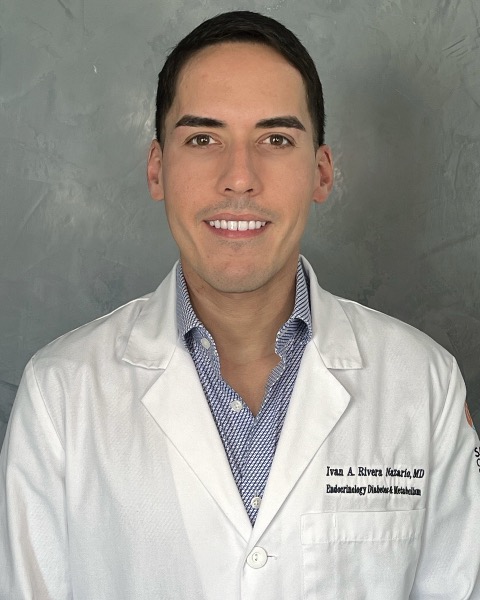Pituitary Disorders/Neuroendocrinology
(13.08) Cushing’s Disease Diagnosis: Exploring the Reliability of Combined Dexamethasone Desmopressin Test
Friday, May 10, 2024
12:50 PM - 1:05 PM CDT
Location: ePoster Showcase, Empire Ballroom Foyer, Level 2

Ivan A. Rivera Nazario, MD (he/him/his)
Endocrinology Fellow
San Juan City Hospital
Trujillo Alto, Puerto Rico, United States
Submitter(s)
Introduction : The diagnosis of Cushing’s syndrome (CS) remains a challenging task in clinical neuroendocrinology. Cushing’s disease (CD) is the most common form of hypercortisolism and 80% of endogenous CS cases are ACTH dependent. Diagnostic approach for suspected CD continues to evolve. However, there is no a simple, non-invasive test that will allow definite diagnosis. The desmopressin stimulation test has been an alternative to corticotropin-releasing hormone (CRH) stimulation test in the diagnosis of CD. Reports have shown that combined dexamethasone suppression and desmopressin stimulation test, results in sensitivity and specificity similar or higher than CRH stimulation test. Hereby, we describe a patient with CD that after performed dynamic test suggesting ectopic ACTH source had remission of the disease after transsphenoidal surgery.
Case(s) Description : A 48-year-old man with past medical history of Asthma, Hypertension, Hashimoto's thyroiditis and Obesity evaluated due to complain of rapidly progressing muscle weakness of eight months of evolution. Accompanied by easy bruising, low back pain and weight gain
of approximately 30 pounds. Physical examination remarkable for violaceous abdominal striae, central obesity, diffuse bruises, proximal muscle wasting and weakness. Laboratory workup with elevated serum cortisol 34.9 ug/dL, ACTH 110 pg/mL and DHEA-S 324 ug/dL. On further evaluation elevated levels of cortisol in late night salivary of 0.62 mcg/dL and 31.1 ug/dL after 1mg dexamethasone suppression test, confirming ACTH-dependent Cushing’s syndrome. Exogenous glucocorticoid use was excluded. Pituitary MRI was done with evidence of diffuse gland enlargement and superior adenoma measuring 1.2 x 1.2 x 1.0 cm. Also, bone densitometry remarkable for osteoporosis.
This clinical presentation meets criteria for diagnosis of CD. Dexamethasone suppression and desmopressin stimulation test were performed suggesting ectopic ACTH source as cause. Chest and Abdomen/Pelvis CT scan without evidence of ectopic tumors. Neurosurgery service was consulted and surgical transsphenoidal tumor resection was done successfully. Follow up laboratory results consistent with postoperative remission and resolution of hypercortisolism.
Discussion : In literature, the use of combined dexamethasone suppression and desmopressin stimulation test have a sensitivity of 89% and specificity of 100%. Resolution of disease after transsphenoidal surgery are rare on cases where testing suggested ectopic ACTH-producing tumor. CD is related to an increase complications and mortality secondary to chronic hypercortisolism. By this, early and precise diagnosis is necessary to reach adequate treatment of disease.
Case(s) Description : A 48-year-old man with past medical history of Asthma, Hypertension, Hashimoto's thyroiditis and Obesity evaluated due to complain of rapidly progressing muscle weakness of eight months of evolution. Accompanied by easy bruising, low back pain and weight gain
of approximately 30 pounds. Physical examination remarkable for violaceous abdominal striae, central obesity, diffuse bruises, proximal muscle wasting and weakness. Laboratory workup with elevated serum cortisol 34.9 ug/dL, ACTH 110 pg/mL and DHEA-S 324 ug/dL. On further evaluation elevated levels of cortisol in late night salivary of 0.62 mcg/dL and 31.1 ug/dL after 1mg dexamethasone suppression test, confirming ACTH-dependent Cushing’s syndrome. Exogenous glucocorticoid use was excluded. Pituitary MRI was done with evidence of diffuse gland enlargement and superior adenoma measuring 1.2 x 1.2 x 1.0 cm. Also, bone densitometry remarkable for osteoporosis.
This clinical presentation meets criteria for diagnosis of CD. Dexamethasone suppression and desmopressin stimulation test were performed suggesting ectopic ACTH source as cause. Chest and Abdomen/Pelvis CT scan without evidence of ectopic tumors. Neurosurgery service was consulted and surgical transsphenoidal tumor resection was done successfully. Follow up laboratory results consistent with postoperative remission and resolution of hypercortisolism.
Discussion : In literature, the use of combined dexamethasone suppression and desmopressin stimulation test have a sensitivity of 89% and specificity of 100%. Resolution of disease after transsphenoidal surgery are rare on cases where testing suggested ectopic ACTH-producing tumor. CD is related to an increase complications and mortality secondary to chronic hypercortisolism. By this, early and precise diagnosis is necessary to reach adequate treatment of disease.
